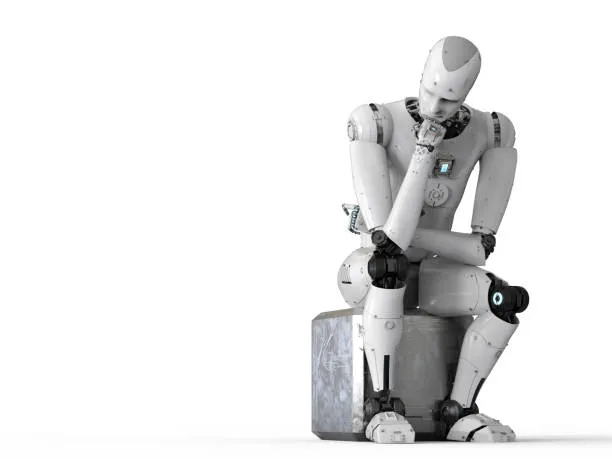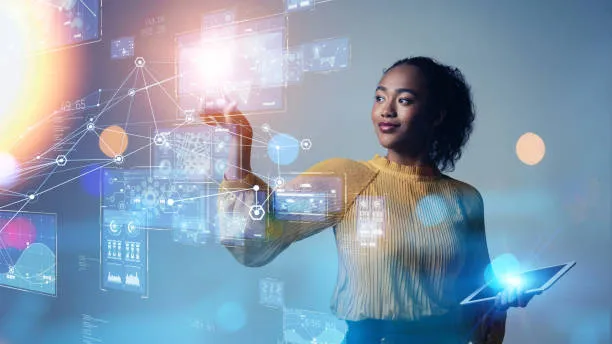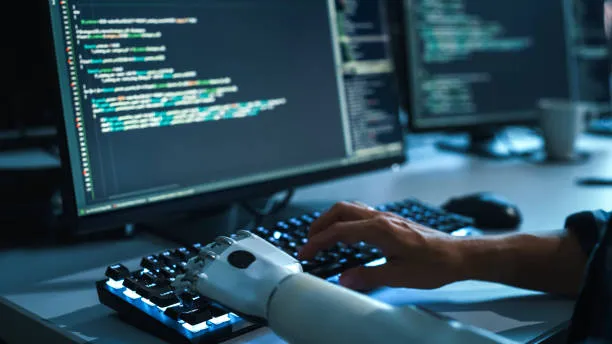Article with focus on
Introduction to AI.
Applications of AI in various sectors.
The future of jobs
Need for a paradigm shift in written application evaluation.
The future of tech skills. (will coding skills still be relevant?)
Conclusion.

3d rendering android robot sits down and thinks. (Credit:PhonlamaiPhoto)
As I delve into the captivating world of AI, I’m struck by the sheer enormity of what it represents for our future. The evolution of Artificial Intelligence is no longer a distant dream; it’s our present reality, and the changes it’s ushering in are nothing short of extraordinary. Take some time and let’s explore the profound impact of AI on our lives, jobs, and the way we think.
Introduction to AI and its Types
AI isn’t a single entity; it’s a dynamic field with various branches. As Andrew Ng, an AI expert and co-founder of Google Brain, says, “AI is the new electricity.” From the genius of machine learning, where algorithms learn and adapt, to the wonders of deep learning, which mimics the human brain’s neural networks, and the incredible realm of natural language processing, AI’s versatility knows no bounds. Think of AI chatbots guiding you through a website, an AI language model like Chatgpt, or AI-powered voice assistants, like the one in your smartphone, making your life easier. The possibilities are endless, and they’re already here. As Max Tegmark, a physicist and AI researcher, notes, “It’s not man versus machine; it’s man with machine.”
Let’s delve deeper into the realm of AI and understand its different types. Machine learning, a subset of AI, is the backbone of many of the AI applications we encounter daily. It’s about training algorithms to learn from data and improve their performance over time. Imagine recommendation systems like those used by streaming services or online retailers, suggesting content or products based on your preferences. Machine learning is the magic behind those personalized suggestions.
Another facet of AI is deep learning, which takes inspiration from the human brain’s neural networks. Deep neural networks can process and understand vast amounts of unstructured data, making them powerful tools for tasks like image and speech recognition. As Geoffrey Hinton, a pioneering figure in deep learning, remarks, “We don’t understand how a brain works, but we can build a brain that works.” You’ve likely interacted with deep learning in the form of virtual assistants such as Siri or Google Assistant, which understand and respond to your voice commands.
Natural language processing (NLP) is the branch of AI that focuses on bridging the gap between human language and computer understanding. When you chat with a customer support chatbot, ask a virtual assistant for information, or even use language translation apps, you’re experiencing NLP in action.
It’s fascinating to see how AI transcends traditional boundaries and infiltrates various aspects of our lives, making it an integral part of the modern world.
Applications of AI in Various Sectors

Digital transformation concept. System engineering. Binary code. Programming. (Credit: metamorworks)
Let’s start with healthcare, a sector where AI’s potential for good is truly remarkable. Dr. Eric Topol, a cardiologist and AI expert, points out, “AI is helping healthcare move from population-based medicine to individualized, patient-centric care.” Medical professionals can use AI algorithms to analyze vast datasets and identify patterns that might not be apparent to the human eye. Early diagnosis of diseases, personalized treatment plans, and the discovery of new drugs are all possible thanks to AI.
On 19th September 2023, the Chan Zuckerburg initiative announced they are building a health AI tool called “virtual cell.” It would give scientists worldwide access to digital models that could predict the behavior of any cell type and how it may respond to different conditions. It's a meticulously organized cell database that empowers researchers to harness AI for the analysis and prediction of cell behavior when affected by diseases. This database will play a pivotal role in advancing scientific research and medical applications.
In the world of finance, AI is transforming the way we manage money. According to Neil Jacobstein, Chairman of AI and Robotics at Singularity University, “AI can analyze market data, news sentiment, and social media to predict market trends.” Predictive analytics can forecast market trends, enabling investors to make informed decisions. Moreover, AI algorithms can detect fraudulent activities, helping banks and financial institutions safeguard your assets.
Transportation is another field where AI is making significant strides. Autonomous vehicles, guided by AI, promise safer roads and more efficient transportation. Whether it’s self-driving cars or delivery drones, the potential for AI in the transportation sector is vast. Nigerian-born engineer and entrepreneur, Frederick Akpoghene and his team at JéGO Technologies are already developing and manufacturing autonomous vehicles including self-driving buses that can safely and efficiently convey people and goods from place to place. Most of the innovations we watch in sci-fi movies are rapidly becoming our reality.
AI’s influence on entertainment is equally profound. It’s not just about creating art; it’s about creating art with a personalized touch. AI-driven music composition tools, for instance, can tailor tunes to your preferences. When you stream music or receive song recommendations on Spotify or Apple Music, you’re experiencing AI’s creative capabilities.
The list of AI applications is endless, with its positive impact reverberating across various sectors. It’s not just a technological advancement; it’s a transformation of our world.
What is the Future of Jobs?

WHAT’S NEXT? (Credit: Canan Turan)
I will start by stating this harsh fact “As long as your job runs on a computer, AI is coming for it”. Much like the seismic shifts that occurred when scientific calculators were introduced in 1972 and the advent of the personal computer in 1974.
When scientific calculators emerged, they eliminated the need for manual calculations, drastically altering the requirements for roles in fields such as engineering and mathematics. Similarly, the proliferation of personal computers transformed industries, creating entirely new roles while rendering traditional ones obsolete. As AI continues its march, jobs that involve routine, repetitive tasks are the most vulnerable. Administrative, data entry, and customer service positions, copywriting, various forms of content and technical writing, and graphics design, among others, are increasingly susceptible to automation.
In the wake of AI’s impact on the job market, it’s important to recognize that while it may displace some roles, it also ushers in a wave of new opportunities. AI is a catalyst for innovation, and as it streamlines processes and augments human capabilities, it simultaneously introduces fresh career prospects. We’re witnessing the emergence of roles like AI trainers and specialists, individuals who ensure that AI systems make decisions transparently and ethically. AI ethics consultants are now in demand, addressing the moral and social implications of AI technology. Furthermore, the field of human-machine collaboration is thriving, with job titles like Human-AI Teaming Facilitator and AI-Enhanced Creativity Coach. These positions reflect the evolving dynamics of our workforce, emphasizing the symbiotic relationship between humans and AI.
Consider the emergence of AI ethics specialists. Nick Bostrom, a philosopher known for his work on AI ethics, emphasizes, “AI can make complex decisions, but are they ethical decisions?” These specialists will be responsible for defining the ethical boundaries within which AI operates, ensuring that it respects human values and societal norms.
The future of jobs is dynamic and ever-evolving. The key to success lies in our ability to adapt, embrace change, and acquire new skills. As AI continues to shape the job market, we must recognize that it’s not a threat but a catalyst for innovation and growth.
A Paradigm Shift in Written Application Evaluation

Young casually clothed concentrated man going over paperwork while working from the living room, he is sitting on the sofa with a laptop in his lap. (Credit: Pekic)
The transformative impact of AI extends to how we evaluate written applications ranging from opportunity applications to college applications. It’s no longer about the originality of the text; it’s about the depth of thought and the ideas presented. AI helps us draft written content and applications more effectively, focusing on the essence of our message. AI has not only revolutionized the creation of written applications but also the evaluation process. Traditionally, applications were assessed based on the originality and eloquence of the text. However, AI-driven tools have changed the game. These tools help applicants articulate and present their ideas more effectively and efficiently, focusing on the substance of their message.
It’s time for a paradigm shift in the way we evaluate applications. Instead of emphasizing style over substance, we should assess them based on the value they bring and the impact they promise. It’s essential that our evaluation processes keep pace with this transformative shift.
The Future of Tech Skills (will coding skills still be relevant?)

Focus on Hands: Programmer With Disability Using Prosthetic Arm to Work on Illuminated Computer Keyboard. Swift and Natural Use of Myoelectric Bionic Hand To Type Code for Software at Night. (Credit: gorodenkoff)
The question lingers: will coding skills remain relevant in an AI-driven world? The answer is “yes for now” Coding isn’t just about syntax and algorithms; it’s about problem-solving and critical thinking. AI can assist, but it can’t replace the ingenuity of the human mind. However, we must evolve our tech skills. The era of generative AI is upon us, and it has changed the landscape of software development. We need to adapt and embrace AI as a powerful tool in our tech arsenal.
As we move forward, the landscape of software development is evolving. Generative AI, capable of creating code, is becoming more prevalent. While some may fear that this will make coding skills obsolete, I believe it presents an opportunity for collaboration. Programmers will work alongside AI to create more efficient, innovative, and reliable solutions. It’s not a question of whether coding skills will remain relevant, but rather how they’ll evolve and adapt to the AI-driven future.
Conclusion
AI is our ever-present companion on this remarkable journey of progress. It’s a testament to our ability to innovate, adapt, and create. As we navigate the AI revolution, let’s remember that the future is bright, and it’s ours to shape. Together, we’ll continue to push the boundaries of what’s possible, making our world a better place one AI-powered step at a time. AI is more than technology; it’s a tool for positive change, and it’s in our hands to wield it wisely for the betterment of society and the world.

